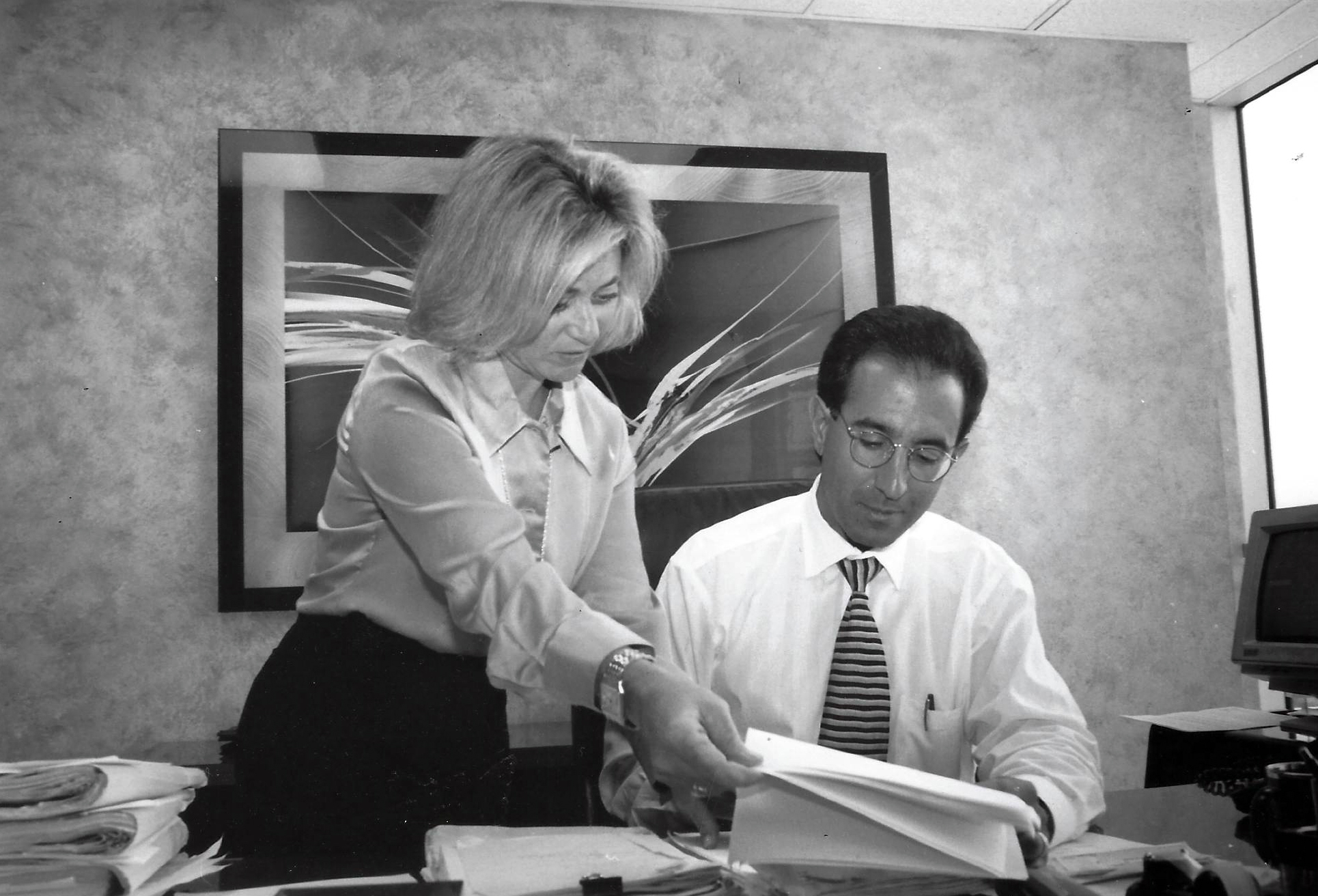Specializing in the aggressive recovery of debts for businesses, commercial collection attorneys at Spiwak & Iezza, LLP target both corporate entities and individuals with unmatched precision. Should your business be cornered by outstanding debts or lingering past due receivables, we stand ready to deploy our legal arsenal on a contingency basis. Our commitment: no stone left unturned in our quest to secure what is rightfully yours.

Spiwak & Iezza, LLP stands apart in commercial collections and litigation. With over three decades of dedicated service, our firm offers unparalleled expertise in navigating complex legal challenges and securing outstanding accounts receivable for our clients. Our approach is distinguished by a blend of aggressive representation, personalized service, and a deep understanding of industry-specific nuances. Our success is not just measured in recoveries, but in the trust and peace of mind we provide to businesses nationwide. Choose Spiwak & Iezza, LLP, where your financial recovery is backed by legal excellence and a proven track record.
Types of Businesses We Help Collect Commercial Debt For
Our team at Spiwak & Iezza, LLP specializes in collecting debts quickly and effectively. We don’t back down, no matter how tough the situation. Our experience spans a wide range of industries, from finance and healthcare to entertainment and manufacturing. We understand the unique challenges each sector faces and tailor our approach accordingly. When you work with us, you’re getting more than just legal help; you’re partnering with a team that’s committed to getting results for your business. Here’s a look at the types of businesses we work with most often:
- Financial Institutions: Including banks, savings and loan institutions, private equity lenders, and both secured and unsecured creditors.
- Legal Professionals: Attorneys, judgment holders, and parties involved in partnership disputes.
- Medical and Dental Services: Doctors, dentists, and other healthcare providers.
- Property and Construction Services: Landlords, property management companies, construction & contractors, commercial equipment lessors.
- Advisory Services: Accountants, forensic accountants, IT service professionals, and other professional service providers.
- Retail and Wholesale Trade: Retail outlets, wholesalers, distributors, including those in food and beverage service.
- Manufacturers and Equipment Providers: Companies involved in manufacturing, steel production, and equipment leasing and finance.
- Transportation and Logistics Services: Transportation involving trucking, shipping, freight and logistics.
- Creative Professionals: Entertainment professionals, sports professionals, and related industries.
- Specific Industry Services: Debt buyers, shipping companies, and other niche industry professionals.
Why Do You Need a Commercial Collections Attorney?
There are several reasons why a business might need a commercial collections attorney. Here’s a breakdown of the main reasons:
- Specialization: Our attorneys have highly specialized skills in the area of commercial debt collection, in particular debts which arise from business-to-business transactions.
- Legal Expertise: Our attorneys are experts in the field of commercial debt collection laws and the rules and regulations which govern these transactions. In addition to commercial collection litigation, we also specialize in consumer collections and possess comprehensive knowledge of the federal regulations which govern this field, namely the Fair Debt Collection Practices Act (FDCPA).
- Litigation: Our attorneys handle all aspects of litigation from the preparation and filing of the initial lawsuit against the debtors who fail to pay their debts through to trial and judgment. Once judgment is obtained through litigation, we proceed to collect the money judgment through such means as garnishment of wages, bank account levies, and/or placement of liens on real property owned by the debtor. We also serve subpoenas for debtors to appear at judgment debtor examinations and we initiate foreclosures of real property.
- Negotiation: Often, before matters reach litigation, our attorneys negotiate with debtors to work out payment plans or settlements.
- Representation: Besides helping businesses collect bad debt, we also advise businesses on how to handle late paying account receivables and how to draft their credit agreements to protect them in the event of a default. Reversely, we can also represent businesses that are being wrongly pursued for debts they do not owe.
- Industry Knowledge: Given the vast experience of collection of commercial debts in certain industries, our attorneys often have a deep understanding of a particular industry and can tailor their approaches based on industry-specific practices and regulations.
- Efficiency and Leverage: Engaging with a commercial collection attorney as opposed to the creditor who is owed the money, adds a layer of seriousness to the debt recovery process that makes collection more likely. Our attorneys’ involvement signals to debtors the creditor’s intent to pursue the debt rigorously, which can often expedite payments.
- Cost-Effective: While there’s a cost associated with hiring an attorney, the potential recovery of significant debts, combined with the avoidance of legal pitfalls, can make it a cost-effective decision in the long run.
- Peace of Mind: Entrusting debt collection to capable professionals enables business owners to concentrate on their core operations, free from the burden of pursuing unpaid debts.
Engaging the services of a commercial collection attorney is beneficial for businesses owed money because the attorney brings expertise and legal leverage to the collection process, often making the recovery of debts more likely as well as more expeditious.
Commercial Collection Case Process
- Review the documents that dictate the potential case.
- If the case is accepted, a Client Fee Agreement will be executed.
- A 10-day Demand Letter will be sent to the party who owes the money.
- A response will be elicited from the party who owes the debt.
- Pre-Litigation Negotiations will ensue.
- If the matter cannot be settled, then legal action will be taken.
- A lawsuit and pre-judgment writ will be filed and served.
- Litigation of the dispute will occur, and judgment will be obtained.
- Post-Judgement negotiations and post judgment collection will proceed.
- Closure of the matter upon case resolution will take place.

Commercial Debt Collection Types
Here are different types of commercial debts that businesses might encounter.
Commercial Transactions and Agreements
- Unpaid Invoices and Accounts Receivable: Including goods sold, services rendered, B2B transactions, trade credits, and subscription or membership dues.
- Financial Instruments and Credit: Promissory notes, credit card debts, loan defaults, and guarantor agreements.
- Commercial Contracts and Leases: Service contracts, equipment financing and leasing, commercial leases, and vendor agreements.
- Judgments and Enforcement: Including judgment enforcement, post-judgment collection, sister state judgments, foreign judgments, and arbitration awards.
Industry-Specific Debts
- Construction and Real Estate: Construction liens, real estate brokerage dues, and disputes arising from construction projects.
- Intellectual Property and Licensing: Royalty payments, licensing agreement fees, and intellectual property infringement damages.
- Technology and Services: Software licensing fees, consultancy fees, and fees for IT and technology services.
Corporate and Business Operations
- Operational Expenses: Utilities and telecom dues, transportation and shipping charges, equipment repair and maintenance, and outsourcing dues.
- Professional and Advisory Services: Retainer fees, research and development costs, employee compensation, and reimbursement for expenses.
Specialized Collections
- Insurance and Financial Services: Insurance premium collection, accounts due from financial institutions.
- Media, Advertising, and Marketing: Fees related to advertising campaigns, PR efforts, media rights, and content distribution.
- Event Management and Membership: Conference and event fees, security and surveillance service fees.
Business Relationships and Transactions
- Partnerships and Joint Ventures: Disputes arising from partnership agreements, joint business ventures, and mergers and acquisitions balances.
- Franchise and Distribution: Obligations owed by franchisees, reseller, and distributor debts.
Miscellaneous Commercial Debts
- Exclusive Agreements and Special Contracts: Exclusivity agreement fees, commercial service contracts, and other breach of contract cases.
Commercial Collection Attorney’s Impact on Business Operations
Commercial collection attorneys can have a significant impact on business operations, particularly for companies in industries such as manufacturing, distribution, shipping, food service, steel manufacturing, and leasing. Our role goes beyond simply recovering outstanding debts; it extends to the overall financial health and stability of the business. Commercial collection attorneys can influence business operations by improving cash flow, reducing financial stress, preventing debt accumulation, providing customized debt recovery strategies, and preserving business and customer relationships.
The Difference Between a Commercial Collection Attorney vs. a Commercial Collection Agency
The primary distinction between a Commercial Collection Attorney and a Commercial Collection Agency lies in their roles and capabilities within the debt recovery process. A Commercial Collection Attorney is a legal professional who specializes in debt collection, possessing a profound understanding of debt collection laws and regulations and the rights and legal tools available to the creditor. They have the authority to initiate legal proceedings, file emergency recovery motions for disappearing collateral, and have the skills needed to be effective in complex cases where the debtor is hiding assets which could be used to satisfy the obligation. On the other hand, a Commercial Collection Agency is a business that contains individuals who simply negotiate with debtors but lack the legal authority of attorneys to go any further than negotiations. They cannot file lawsuits or partake in any of the legal remedies available to creditors to collect the debt.
Our Experienced Commercial Debt Collection Attorneys
Choosing the highly experienced commercial debt collection lawyers at Spiwak and Iezza, LLP, is a strategic move for businesses seeking comprehensive and effective debt recovery solutions. With our rich history and proven track record, our attorneys at Spiwak and Iezza bring not just legal acumen, but also a nuanced understanding of the business landscape, ensuring a tailored approach for every client. Our vast experience translates to a deep familiarity with debt collection laws, efficient negotiation tactics, and a swift navigation through complex litigation processes. With over 32 years of experience, engaging with Spiwak and Iezza, LLP ensures that businesses are backed by seasoned professionals whose primary goal is to protect their client’s interests and achieve optimal financial resolutions.
***Disclaimer: This page has been prepared by Spiwak & Iezza, LLP for informational and educational purposes only. The content is intended to provide a general overview of the law and does not constitute specific legal advice. Viewing this page or using this site does not establish an attorney-client relationship with Spiwak & Iezza, LLP or any of its members. Additionally, because laws are subject to frequent changes, some of the information provided may no longer be current or applicable.



